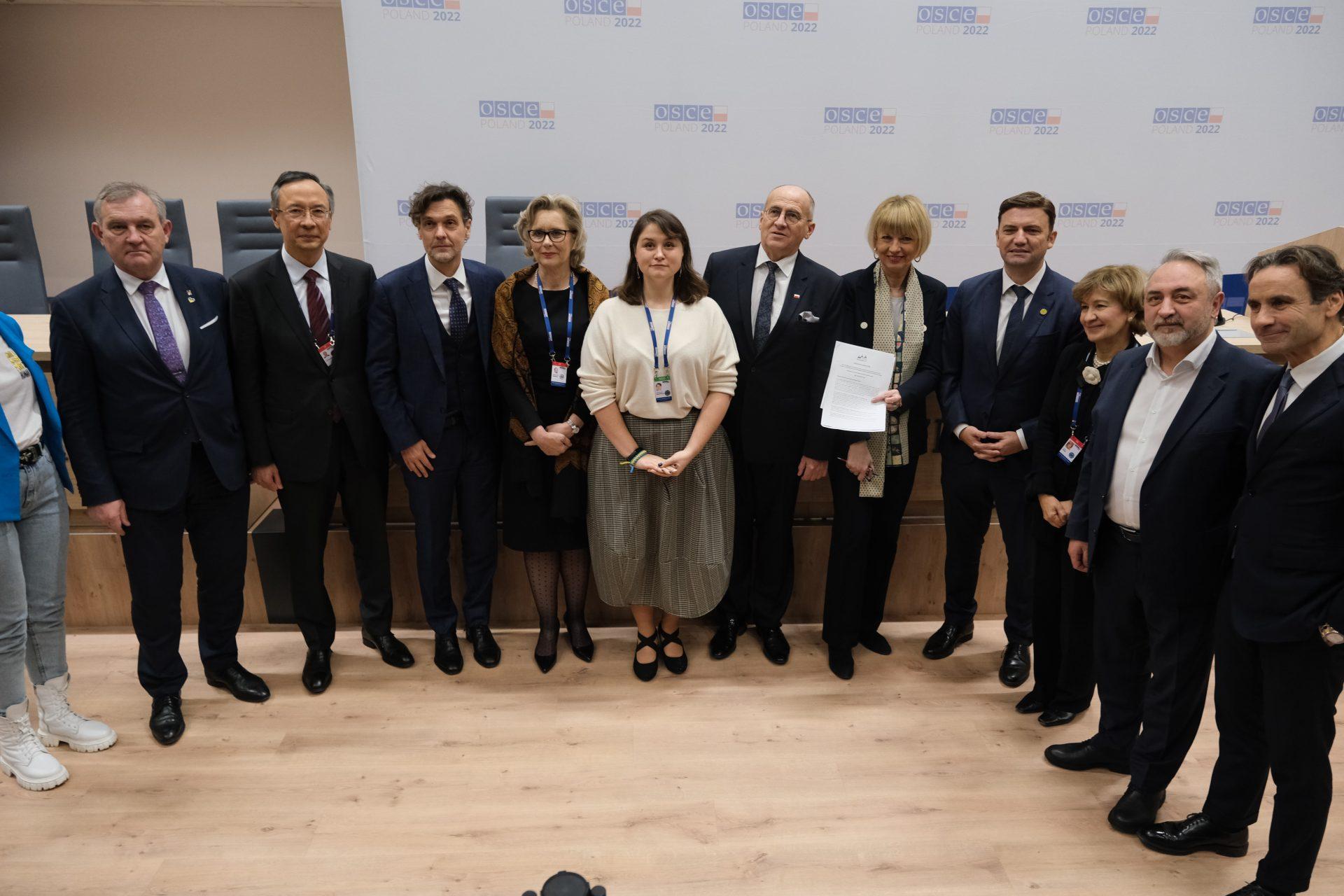OSCE Parallel Civil Society Conference 2022

The OSCE Parallel Civil Society Conference 2022 tool place on Wednesday, 30 November 2022 in Łódź, on the eve of the OSCE Ministerial Council meeting. As in previous years, the Parallel Conference is organized by the OSCE-wide NGO network, the Civic Solidarity Platform (CSP), with the support of the Polish OSCE Chairpersonship 2022.
This year Center for Civil Liberties performing Secretariat tasks of the Civic Solidarity Platform.
The Parallel Civil Society Conference 2022 build on the traditions of OSE Parallel Conferences held in Astana (2010), Vilnius (2011), Dublin (2012), Kiev (2013), Basel (2014), Belgrade (2015), Hamburg (2016), Vienna (2017), Milano (2018) Bratislava (2019) Tirana (2020, online) and Stockholm (2021). These conferences have provided a forum for civil society to seek answers to current challenges in the OSCE work and implementation of OSCE commitments by participating States and develop strategies and recommendations to try to empower OSCE political bodies, institutions and participating States.
This Conference brings together researchers and experts from civil society and OSCE diplomatic community, international and regional offices from Western Europe, South-Eastern Europe and Central Asia.
The conference is organized by the Civic Solidarity Platform, an international civil society platform in close contact with the OSCE. Among the over 100 member organizations, three of this year’s Nobel Peace Prize winners are Вясна. Правы чалавека ў Беларусі / Viasna. Human rights in Belarus, Center for Civil Liberties / Центр Громадянських Свобод from Ukraine and Memorial from Russia.
It is a joint undertaking of the Center for Civil Liberties, Memorial, Viasna Human Rights Centre, Center for the Development of Democracy and Human Rights, IHPR, the Netherlands Helsinki Committee, DRA-Austausch e.V. and many others.
This conference is a reminder to honor the work of individuals working for the protection of fundamental human rights and to honor work aimed at promoting peace and security in the OSCE region.
The conference was divided in 4 panels consecutive panels: Russian Aggression against Ukraine. Addressing the Accountability Gap moderated by Antanina Maslyka, Netherlands Helsinki Committee, Crisis in Russia and Belarus: From Repression to Aggression moderated by the Centre for the Development of Democracy and Human Rights, Evaluation of the implementation of selected human dimension commitments by States holding Chairpersonship: North Macedonia and Poland moderated by Oleksandra Romantsova and the Discussion on the Future of the OSCE moderated by Simon Papuashvili, International Partnership for Human Rights (Belgium) followed by the presentation of the Conference outcome document and comments by OSCE officials.
This year’s Declaration is entitled “Stop the Aggression, End Impunity, Ensure Justice and Accountability, and Launch a Process to Strengthen the OSCE and Reaffirm Strong Commitment to Helsinki Principles” and includes the following sections:
– Solidarity with Ukraine and a Need for Stronger Support
– Ensuring Justice and Closing the Accountability Gap
– Connection between Repression and Aggression. A Need for Effective
– Instruments of Reaction to Human Dimension Crises
– Other key challenges
– Civil society space
– The Future of the OSCE: A Need for Change
A brief summary of the Declaration:
- Sadly, the OSCE could not avoid war in Europe. The organization going to have to reform itself. A major factor is strengthening the role of civil society in preventing wars in the 21st century. Because violent conflict is always preceded by the repression of civil society actors. We must observe the restriction of freedom of expression and human and civil rights not only in Russia, but also in countries such as Belarus, Turkey and Azerbaijan.
- We, therefore, call for an OSCE coordinator for civil society to permanently combine concerns for the protection, strengthening and participation of civil society at the highest level.
- The democratic member states of the OSCE are required to set up an informal group of friends of civil society. We need strategies to strengthen civil society in the OSCE area as an essential foundation for a peaceful world order.
- In the face of the largest land war in Europe since World War II, we demand the establishment of an international tribunal under the roof of the UN, for which Russian war criminals will have to be held accountable.
At the Conference, we introduced the Declaration and presented it to representatives of the Chairpersonships (present and incoming) and the leadership of OSCE institutions, who could then each make short remarks in response.
Civic Solidarity Platform representatives presented the Conference outcome document, a Declaration to the OSCE Chair-in-Office, Polish Foreign Minister Zbigniew Rau and his colleagues H.E. Bujar Osmani, Incoming OSCE Chair-in-Office, Helga Maria Schmid, OSCE Secretary General, Matteo Mecacci, OSCE/ODIHR Director, Teresa Ribeiro, OSCE Representative on Freedom of the Media, Margareta Cederfelt, President of OSCE Parliamentary Assembly, Kairat Abdrakhmanov, OSCE High Commissioner on National Minorities.
The goal of the OSCE is to ensure peace in Europe, Russia’s attack on Ukraine is a severe setback for the organization. The role of the Civic Solidarity Platform is now all the more important. Against the backdrop of the Russian offensive war, civil society actors are currently organizing humanitarian aid in Ukraine and for Ukraine. And it’s about defusing conflict – by keeping civil society organizations in conversation across borders, they prevent the trenches from growing even deeper. This is also important in view of conflicts such as Armenia and Azerbaijan, or Kyrgyzstan and Tajikistan.

